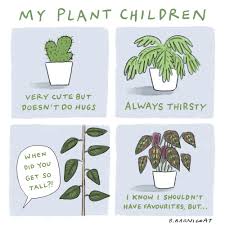The 'Plant' Society
Once upon a time...
...a man went out to buy a plant. He didn't know much about plants except that they all need water, sunlight and air. He felt his home could do with some decoration to lively up the place. It also feels good when being able to take care of things.
He brought the plant home and placed it on a table that he cleared JUST for the plant. He bought a watering can and found the best spot in the house for sunlight to place the table for the plant. A few days went by and he consistently watered the plant with two cups of water everyday, and left it exactly in the spot he put it. Everyday he woke up, or came back home and saw the plant, he was quite pleased with himself.
After about a week and a half, the plant started to droop. He assumed this meant he was not watering it enough. So he started to give the plant 3 cups of water a day. Only a few days after that, the plant had looked even worse. The leaves were turning colour and falling off. He decided to move the plant from the table to the windowsill. About a week later, the plant was dead.
He was convinced that the vendor he bought the plant from sold him a dud. They must have given him a faulty plant. So, he went back to the vendor and demanded an explanation. The vendor gave him another of the same kind of plant but this time, with instructions:
This plant only needs one cup of water a day. It prefers dim light, so try not to put it in direct sunlight.
The man brings his new plant home and repositions the table. He follows the instructions of the vendor. One month later and the plant is thriving! He has crowned himself, King of the Plants.
Feeling confident in his new role, he goes out and buys another plant. This plant is a little different to the first and second one but it didn't matter to the King. A plant is a plant, and as far as he knew, he had the plant-flourish formula. He brought the new plant home and placed it next to his thriving plant. He looked at them and beamed with pride. He gave each of them one cup of water and ensured not to put it in direct sunlight. He was so excited to see his new plant grow.
A few weeks later, the new plant starts to look weak. He mumbles to himself that he should have stuck to his original vendor. Another dud plant. He had been hustled yet again..or so he thought. He decided to try his original formula. He put the plant in direct sunlight. It seemed to perk up. He then started to add the two cups of water daily. The plant weakened again. He removed it from the sunlight and continued to give it two cups of water...
After a few weeks of steady decline from the third plant, he gave up and just left it. He continued taking care of his thriving plant and left the "dud" plant to fend for itself. Surprisingly, the "dud" plant seemed to survive. It didn't bloom the way it was supposed to, but it wasn't dead! So it lived in a little corner, while the thriving plant was put as the center piece, for all his guests to marvel.
------
I don't know if stories like this exist anywhere else but I thought about it in the hours I tried to sleep. I felt urged to share it.
This is not just a story about plants, but a story of child-rearing. For a very long time, it was assumed that children needed pretty much the same things: food, shelter, clothing, an education and (hopefully) play. It was assumed that there was a 'one-size-fits-all' approach to parenting. And children who do not "bloom" in the ways they are supposed to, are seen as problematic. They are seen as the problem.
Babies are not blank slates like we have previously thought. Babies come into this world with different propensities and potential. Some children are shy, some are outgoing, some are daring, some are cautious, some think well, some do well, some are good with numbers, some are good with words. When we, as guardians, use the same approach to every child, we put the children at a disadvantage.
When we use the same teaching style for every child, we unconsciously exclude certain children from learning.
When we use the same love language for every child, we unconsciously exclude certain children from feeling loved.
When we use the same diet for every child, we unconsciously exclude certain children from nutritious nourishment.
This unconscious exclusion is not an excuse for a lack of accountability. When we know better, we must do better.
The King of Plants is not excused for his limited knowledge of plants. When we are interested in a product, we do research. We find out what is required to obtain AND MAINTAIN the product. Before having children, we must do our research! And when the child is born (if you still want to procreate after doing research), we must continue our research in the form of constantly getting to know the child. There are many things influencing a child at any point in time, and we must be in tune with our children to be able to adjust to their changes. Their needs change as they are exposed to different stimuli and as they grow older. Being connected to our children through communication, affection, RESPECT(two-way street) and healthy boundaries allow us to build a relationship with our children that keeps us in tune with what they need. So that we may provide or help provide them with the resources to meet those ever-changing needs.
Our children are not faulty. Our children are not 'the problem.' Children are products of their environment. When they are "misbehaving," we must look to the environment. That includes us. What are they lacking? What is it they need? What is it they are yearning for? We are living in a world that has VERY LITTLE regard for children. Decisions are constantly being made for them, they are constantly being told what to do, where to be, how to be... They do not have a voice. Their concerns constantly go unheard..for what do children know?
Stay in a child's place..
What you have to worry about? You have bills to pay?...
That you crying for?...
You running around too much! Stay one place!
The state of a nation will always reflect the way it treats its youth (our future) and its elders (our history). And the society and economy that we live in diminishes the importance of the bodies that are unable to be "productive." The bodies that are not "generating income." And worse yet, COSTING us money. We are only concerned about able-bodied people who can go out and work. And if society continues to move in this direction, we are doomed.
Please, love on your children. Let them know they matter. They will soon be the adults in charge. What kind of people do we want to be in charge? What are the ways in which we can instill those values in them right now? What characteristics seem difficult now but will serve them well in the future, if nurtured well?
Let us be cautious of where we plant our seeds. Let us be cautious of how we nurture our seeds. Let us be mindful of how we maintain the healthy "plants" that we want to see our seeds grow into. Let us be proud of our contributions to the Plant Society.




Comments
Post a Comment